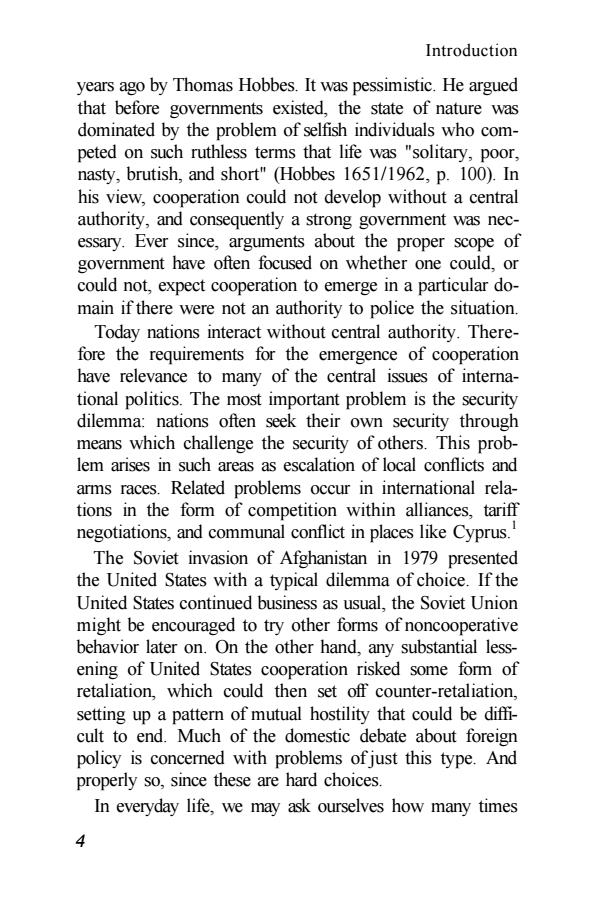正在加载图片...

Introduction years ago by Thomas Hobbes.It was pessimistic.He argued that before governments existed,the state of nature was dominated by the problem of selfish individuals who com- peted on such ruthless terms that life was "solitary,poor, nasty,brutish,and short"(Hobbes 1651/1962,p.100).In his view,cooperation could not develop without a central authority,and consequently a strong government was nec- essary.Ever since,arguments about the proper scope of government have often focused on whether one could,or could not,expect cooperation to emerge in a particular do- main if there were not an authority to police the situation. Today nations interact without central authority.There- fore the requirements for the emergence of cooperation have relevance to many of the central issues of interna- tional politics.The most important problem is the security dilemma:nations often seek their own security through means which challenge the security of others.This prob- lem arises in such areas as escalation of local conflicts and arms races.Related problems occur in international rela- tions in the form of competition within alliances,tariff negotiations,and communal conflict in places like Cyprus. The Soviet invasion of Afghanistan in 1979 presented the United States with a typical dilemma of choice.If the United States continued business as usual,the Soviet Union might be encouraged to try other forms of noncooperative behavior later on.On the other hand,any substantial less- ening of United States cooperation risked some form of retaliation,which could then set off counter-retaliation, setting up a pattern of mutual hostility that could be diffi- cult to end.Much of the domestic debate about foreign policy is concerned with problems ofjust this type.And properly so,since these are hard choices. In everyday life,we may ask ourselves how many times 4Introduction years ago by Thomas Hobbes. It was pessimistic. He argued that before governments existed, the state of nature was dominated by the problem of selfish individuals who competed on such ruthless terms that life was "solitary, poor, nasty, brutish, and short" (Hobbes 1651/1962, p. 100). In his view, cooperation could not develop without a central authority, and consequently a strong government was necessary. Ever since, arguments about the proper scope of government have often focused on whether one could, or could not, expect cooperation to emerge in a particular domain if there were not an authority to police the situation. Today nations interact without central authority. Therefore the requirements for the emergence of cooperation have relevance to many of the central issues of international politics. The most important problem is the security dilemma: nations often seek their own security through means which challenge the security of others. This problem arises in such areas as escalation of local conflicts and arms races. Related problems occur in international relations in the form of competition within alliances, tariff negotiations, and communal conflict in places like Cyprus.1 The Soviet invasion of Afghanistan in 1979 presented the United States with a typical dilemma of choice. If the United States continued business as usual, the Soviet Union might be encouraged to try other forms of noncooperative behavior later on. On the other hand, any substantial lessening of United States cooperation risked some form of retaliation, which could then set off counter-retaliation, setting up a pattern of mutual hostility that could be difficult to end. Much of the domestic debate about foreign policy is concerned with problems of just this type. And properly so, since these are hard choices. In everyday life, we may ask ourselves how many times 4